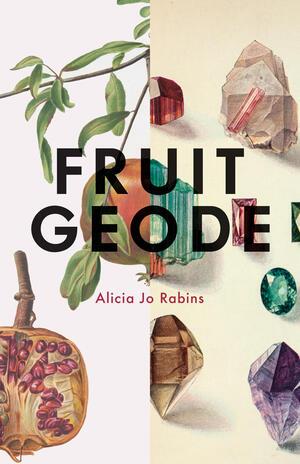Alicia Jo Rabins On Her New Poetry Collection, "Fruit Geode"
Alicia Jo Rabins’s second poetry collection, Fruit Geode, is a searingly personal account of making the transition to motherhood as a Jewish woman in the early years of the millenium. Rabins investigates the passages of pregnancy, birth, and early infancy through a constellation of ancient and modern experience, drawing on her diverse and interwoven practices as an artist and teacher: she is at once a Jewish educator focusing on gender in ancient texts, a musician interpreting stories of women in Torah, and a poet writing about her own lived experience.
Following is Rabins’s exclusive reflection for JWA about her inspiration and creative process for two selected poems.
BOY, GIRL, ANGEL, GOLEM
I am a slot machine
I am a globe
spin me
put your finger down
buy a guidebook buy a ticket
find a cheap hotel
in the Old City
meet me on the roof
for a drink
show me the lights from above
read my tongue my bellyshape
boy, girl, angel, golem
you dissolve my allegiance
I forget who I was
I learn to say my new name
the globe collapses
to a dot
the dot is you
I’ll follow you anywhere
This poem is about the experience of gestating a child, that strange extended moment, through the lens of some of my Jewish experiences.
While pregnant with my first child, I felt very clearly the weirdness of carrying within myself a cosmic roll of the dice, knowing that DNA was being combined and chromosomes knitted moment by moment. We elected not to find out the gender until birth, but that basic mystery of gender was only one of so many variables that would remain a mystery until later. There was nothing to do but wait, while a miracle occurred within my body. Meanwhile, I was living in New York City, and strangers on the streets and subways–all ages, from varied cultures–would point to my high, round belly and say confidently, “That’s a boy.” (She wasn’t.)
I kept thinking about how many choices and random variables combine to create any new human being. In writing about this experience, I combined images of chance, roundness and travel, describing myself as a slot machine and a globe, then leading back to a rooftop hostel in the Old City I remember from my first few nights during my first visit to Jerusalem at age twenty-one, at the beginning of two years of yeshiva study which changed the course of my life.
I also included a text which I’d always remembered from my yeshiva years, about the creation of humans, which contains the word golem. (This word is especially dear to my heart because for eight years I played fiddle in a klezmer-punk band named Golem.) Most commonly known as the name of the Jewish monster whose legend dates to late-16th-century Prague, a creature made of clay by Rabbi Judah Lowe, the word first appears in actually Psalm 139, where galmi means “my unshaped form” or “my raw material.” In the Talmud, the rabbis put this in Adam’s mouth to describe his creation, when he was just a shapeless lump of dirt. Somewhere between angel and golem, I thought, this gestating creature inside me, a child woven–as we all are–from destiny and chance, a child I already knew I would follow anywhere.
MAGIC MOVES SIDE TO SIDE
Gravity moves up and down,
magic side to side.
I stood beneath the traffic light
waiting for you.
It was sheep-shearing season
and I your sheep.
I knew this meeting was the fulcrum:
young me to old me,
old me to new me.
As a mother carries her young
daughter to the toilet
in the middle of the night
to help her body learn
to hold its liquids,
I carry myself,
I teach myself when to hold,
when to spill.
One of my favorite aspects of Judaism is how the sacred and the everyday intersect. Shabbat: a mystical union of the feminine Divine with the transcendent God, or a time to chill out and eat delicious food? Both, of course. This echoes what I experience every day, where marriage to the love of my life interweaves with syncing our calendars and arranging kid pick-ups, where caring for my children alternates between wonder and drudgery.
In that spirit, this poem combines two very different elements of my current life: teaching Torah, and caring for young children. I was thinking of the Biblical character Tamar while I wrote this, so it is at once in her voice and in mine.
The first half of the poem draws on her story (Genesis 38); the second is about potty training. Throughout, details of the external world exist as signs of a mysterious, hidden world. A modern traffic light represents the Biblical crossroads where Tamar waited to seduce Judah; a mother carrying her daughter to the toilet in the middle of the night recognizes that adults, too, learn what to divulge, and what to keep to themselves.
(For more about Tamar, including a song I wrote in her voice, see the Girls in Trouble Curriculum.)
Fruit Geode is one of JWA's 2018-2019 Book List picks.







